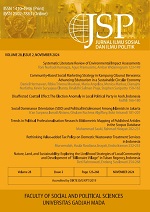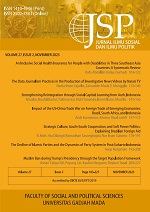Special Economic Zone at the Crossroads: The Case of Batam
Adiwan F. Aritenang(1*)
(1) Regional and City Planning Program School of Architecture, Planning and Policy Development Institut Teknologi Bandung, Indonesia
(*) Corresponding Author
Abstract
The establishment and development of Batam are very much related to Indonesia’s development itself. Considering its strategic location, since the 1970s, the Indonesian government has planned and developed Batam to catch economy spillovers from Singapore. The decentralization induces new development paths through critical juncture restructure the institutional setting in the Batam government and innovation of ICT by the Batam Indonesia Free Zone Authority (BIFZA leaders. These new paths introduce new development trajectories for Batam that has relied on manufacturing and infrastructure for its economic development. The paper analyses the impact of the political economy shift on Batam’s economic growth. Using historical institutionalism, the paper argues that the city exhibit urban economy resilience as, despite national politico-economy turbulence, the city creates new opportunities for alternative economic growth channels. The innovation, knowledge accumulation and strong informal ties allow the ICT sector to emerge as the driver of economic growth, adding to the manufacturing sector. This shows the importance of technology adaptation to avoid institutional lock-in and path dependence for local development.
Keywords
Full Text:
PDFReferences
Alm, J., Aten, R.H., & Bahl, B., (2001). Can I nd ones ia d ec entralis e s uc c es s fully? Plans, problems and prospects. Bulletin of Indonesian Economic Studies, 37(1), 83-102. doi: 10.1080/000749101300046537
Amir, S. (2013). The technological state in indonesia: The co-constitution of high technology and authoritarian politics. London and New York: Routledge.
Aritenang, A. F. (2016). The impact of state restructuring on Indonesia’s regional economic convergence. Singapore: ISEAS Publishing
Behrens, C. (2012). Success fact ors for A n E -governm ent s trategy: Aus trian experiences, Indonesian challenges. Journal of Government and Politics, 3(1), 29-44.
BIFZA. (2014). Pengembangan FTZ dan Global Value Chain Batam Bin Karimun Kelembagaan dan Infrastruktur. Urban Magz. Batam: BIFZA.
BIFZA. (2016). Development progress of Batam report volume XXIX. Batam: BIFZA.
Booth, A. (2003). Decentralization and poverty alleviation in Indonesia. Environment and Planning C: Government and Policy, 21(2), 181–202. doi: 10.1068/c0127
Booth, A. (2011). Splitting, splitting and splitting again: A brief history of the development of regional government in Indonesia since independence. Bijdragen tot de taal-, land- en volkenkunde/ Journal of the Humanities and Social Sciences of Southeast Asia, 167(1), 31-59. doi: 10.1163/22134379-90003601
Brown, I. (2004). The Territories of Indonesia. London: Routledge.
Eaton, K. (2004). Desig ning sub nat ional institutions. Comparative Political Studies, 37(2), 218-244.
Firman, T., Kombaitan, B., & Pradono, P. (2007). The dynamics of Indonesia’s urbanisation, 1980–2006. Urban Policy and Research, 25(4), 433-454. doi: 10.1080/08111140701540752
Fitrani, F., Hofman, B. & Kaiser, K. (2005). Unity in diversity? The creation of new local governments in a decentralising Indonesia. Bulletin of Indonesian Economic Studies, 41(1), 57-79. doi: 10.1080/00074910500072690
Grunsven, L. v. (2013). Singapore’s ICT Industry: An evolutionary perspective. In P. Cooke, G. Searle, & K. O’Connor (Eds.). The Economic Geography of the IT Industry in The Asia Pacific Region. London: Routledge.
Grunsven, L. v., & Hutchinson, F.E. (2014). The evolution of the electronics industry in the SIJORI Cross-Border Region. Singapore: ISEAS Economics Working Paper.
Hill, H. (2014). An introduction to the issues. In H. Hill (Eds.), Regional Dynamics in a Decentralized Indonesia (pp. 1-24). Singapore: ISEAS Publishing.
Irawan, H., Suhardi, S., & Sofia, A. (2012). IT value creating in Indonesian local government: A service model. In H. Handra, B. Resosudarmo, A. Yusuf, E. Elfindri, & E. Yonnedi (Eds.), Regional development and finances: Challenges for expanding and financing public services. Padang: Andalas University Press.
Jati, W.R. (2014). Kewargaan inklusif sebagai paradigma alternatif pelayanan publik. Jurnal Ilmu Sosial dan Ilmu Politik, 18(1), 66-79.
Kleibert, J. M. (2013). Strategic coupling in ‘next wave cities’: Local institutional actors and the offshore service sector in the Philippines. Singapore Journal Tropical Geography, 35(2), 245–260.
Kumar, S., & Siddique, S. (2013). Batam - Whose Hinterland? The Influence of Politics on Development (1st Ed.). Singapore: Select Publications.
Mahoney, J., & Thelen, K. (2010). Explaining institutional change: ambiguity, agency, and power. Cambridge: Cambridge University Press.
North, D.C. (2010). Understanding the process of economic change. Princeton, N.J: Princeton University Press.
Pepinsky, T. B. & Wihardja, M. M. (2011). Decentralization and Economic Performance in Indonesia. Journal of East Asian Studies, 11(3), 337-371. doi: 10.1017/s1598240800007372
Phelps, N.A., Bunnell, T., Miller, M.A., & Taylor, J. (2014). Urban inter-referencing within and beyond a decentralized Indonesia. Cities, 39, 37–49. doi: 10.1016/j.cities.2014.02.004
Rodríguez-Pose, A., & Storper, M. (2006). Better rules or stronger communities? on the social foundations of institutional change and its economic effects. Economic Geography, 82(1), 1-25.
Salahuddin, M., & Rusli, A. (2005). Information systems planning for e-government in Indonesia. Presented at the The Second International Conference on Innovations in Information Technology. Dubai: UAE
Sandee, H., Nurridzki, N., & Dipo, M. (2014). Challenges of implementing logistics reforn in Indonesia. In H. Hill (Eds.), Regional Dynamics in a Decentralized Indonesia. (pp. 386). Singapore: ISEAS.
Seymour, R., and Turner, S. (2002). Otonomi Daerah: Indonesia’s decentralization experiment. Journal of Asian Studies, 4(2), 33-51
Sihombing, E.M. (2012). An analysis of business licensing policy implementation of Batam’s One Stop Service (OSS) and lessons learned from Singapore’s Online Business Licensing Service (OBLS). Jurnal Ilmiah Administrasi Publik, 13(2), 265– 277.
Slater, D., & Simmons, E. (2010). Informative Reg ress: Crit ical Ant ecedent s in Comparative Politics. Comparative Political Studies, 43(7), 886 -917.
Suwanan, A.F, & Sulistiani, E.H. (2010). Fiscal Decentralization and regional disparities in Indonesia: dynamic panel evidence. In D. Priyarsono & E. Rustiadi (Eds.), Regional Development in Indonesia. Bogor: Crestpent Press.
Thelen, K. (2004). How institutions evolve: the political economy of skills in Germany, Britain, the United States, and Japan (1st ed.). Cambridge: Cambridge University Press.
van Campenhout, M. & de Graaf, J. R. (2013). In search for a silver lining: the evolution of the E & E industry of Batam (Master Economic Geography Thesis). Netherlands: Department of Human Geography and Planning, Faculty of Geosciences University of Utrecht.
van Grunsven, L., & Hutchinson, F.E. (2015). The evolution of the electronics industry On Batam Island (Riau Islands Province, Indonesia): an evolutionary trajectory contributing to regional resilience?. GeoJournal, 82(3), 475-492. doi:10.1007/ s10708-015-9692-9
Wibowo, D.S., Abdullah, I., & Darwin, M. (2014). The Growth of E-Government in the Government of Yogjakarta City. Journal of Government and Politics, 5(1), 32-48.
Widyastuti, H., Muly aningty as, D., & Brajawidagda, U. (2013). E-learning readiness in Hinterland of Batam. Presented at the The Second International Conference on Knowledge creation and Intelligent Computing. Bali: KCIC.
World Bank. (2017). Brief: e-Government. Retrieved June 9, 2017 from http://www.worldbank.org/en/topic/ict/brief/e- gov- resources#egov
Wulandari, F. R., & El Anshori, Y. T. (2012). Optimizing public service through e-gov services: the case of public service in South Jakarta Municipality. Journal of Government and Politics, 3(2), 369-390.
Yeoh, C., Lim, D., & Kwan, A. (2004). Regional co- operation and low-cost investment enclaves: an empirical study of Singapore’s industrial parks in Riau Indonesia. Journal of Asia-Pacific Business, 5(4), 43-65.
Article Metrics
Refbacks
- There are currently no refbacks.
Copyright (c) 2017 Jurnal Ilmu Sosial dan Ilmu Politik

This work is licensed under a Creative Commons Attribution-NonCommercial-NoDerivatives 4.0 International License.























